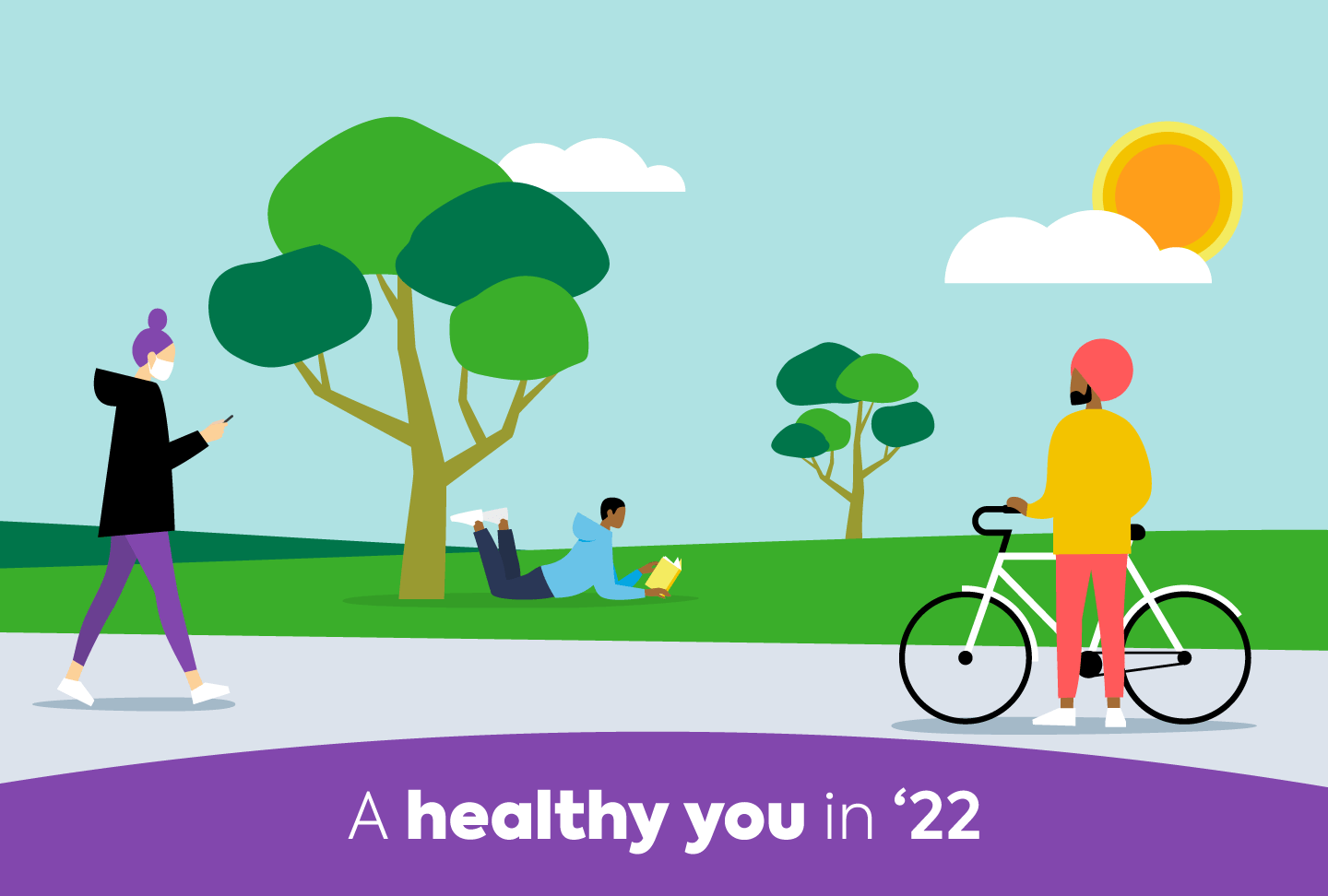With the holiday season now behind us, people look forward to the fresh start of the New Year and all the possibilities it brings. For many of us, that means setting resolutions to live a healthy, full life.
Without the proper planning and support, however, these ambitions can quickly be put off or even forgotten. In 2022, it’s time to break the cycle and make progress towards your goals.
By following tips from Wellstar health experts, you can create realistic resolutions, better your health and stay motivated.
Here’s to a Healthy You in ‘22
Published on January 03, 2022
Last updated 09:43 AM January 03, 2022

Pick one or two resolutions that you believe to be important, implementable and impactful. If the resolution is important to you, be sure you understand the ‘why’ behind the resolution.
- Dr. Rebecca Gomez
Wellstar Clinical Health Psychologist
How to reach your health goals
Making a resolution can sometimes feel daunting, but it doesn’t have to be. Dr. Rebecca Gomez, Wellstar clinical health psychologist and Clinician Resiliency & Well-Being Program Lead, shared easy ways to identify and create goals.
“Pick one or two resolutions that you believe to be important, implementable and impactful,” Dr. Gomez advised. “If the resolution is important to you, be sure you understand the ‘why’ behind the resolution.”
Use the SMART goal-setting system to help define your goal and develop attainable resolutions.
- Specific — Be clear about what exactly you want to accomplish. Include as many details as necessary, such as potential obstacles or extra requirements.
- Measurable — Use metrics to measure your progress and determine how to meet the goal. If you have a big goal, you may need to set smaller milestones along the way to stay on track.
- Achievable — Attainability is an important factor to consider when it comes to goal setting. “While behavior change comes with any resolution, it is also unfair to yourself if you set a goal that is not feasible,” Dr. Gomez added.
- Relevant — Align your resolutions with your life purpose and reasonable wellness goals based on your current health status and available resources.
- Time bound — Set a realistic, target deadline to reach your goal with checkpoints at intervals along the way. Markers provide an opportunity to measure progress and reassess any changes needed to stay on track.
Keep in mind, you may encounter some bumps in the road along the way. Recognizing all the small accomplishments can help you stay motivated and win in the long run.
“Find ways to celebrate success throughout the year. Focus on what small steps you’ve accomplished rather than how far you have to go,” Dr. Gomez shared. “Also, have a resiliency plan to help you bounce back after a more challenging day.”
Partner with a Wellstar provider
When it comes to your wellness goals, staying healthy starts with a visit to your Wellstar primary care provider.
Drs. Shamamah and Asher Niazi, Wellstar internal medicine providers, shared why regular appointments are vital for your well-being.
“Wellness exams and health screenings are so important because they can pick up problems that the patient is not aware of yet,” explained Dr. Shamamah Niazi.
“A wellness exam provides a full 360° view of a patient’s health,” added Dr. Asher Niazi. “This includes what risk factors they may carry, and if they are up-to-date on all their preventive care like immunizations, vaccinations and other screenings.”
To check your health status and screen for potential medical issues, your physician will take your Foundational 4 numbers for:
- Blood pressure. A blood pressure test helps diagnose hypertension (high blood pressure), hypotension (low blood pressure), heart disease and other conditions.
- Blood glucose level. The amount of glucose (sugar) in your blood can indicate the onset of diabetes or risk of heart disease, heart attack, or stroke.
- Blood cholesterol. Low-density lipoprotein (LDL), often called “bad” cholesterol, can show clogged arteries which may lead to heart disease, heart attack or stroke.
- Body mass index (BMI). A higher level of body fat may indicate an increased risk for heart disease, hypertension (high blood pressure) and diabetes.
Abnormal results during these tests can indicate risk factors, such as obesity or high blood pressure, or even the onset of a serious health condition like diabetes. Your physician may also perform other screenings — including hearing, vision or depression — to check your overall health and well-being.
Whether your resolution is weight to lose weight, better manage a chronic condition or be more active, your healthcare provider is a great source of support. They will work together with you to create a personalized plan to help you succeed.
Ready to tackle your wellness goals this year? Book an appointment with a Wellstar primary care provider today.



